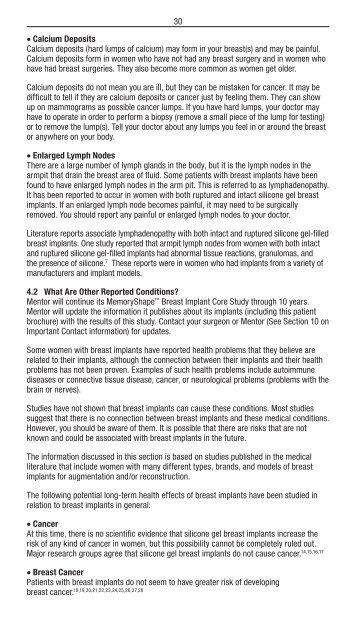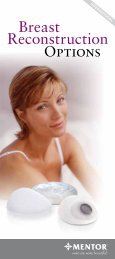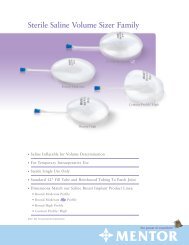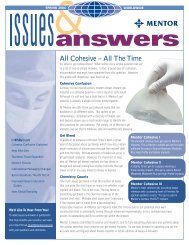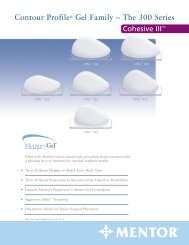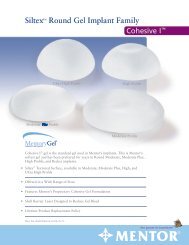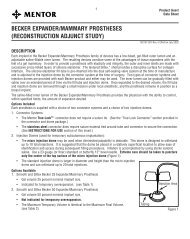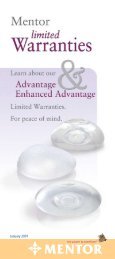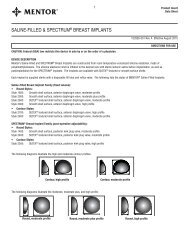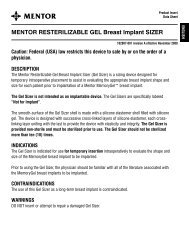Breast Reconstruction Patients Educational Brochure - Mentor
Breast Reconstruction Patients Educational Brochure - Mentor
Breast Reconstruction Patients Educational Brochure - Mentor
- No tags were found...
Create successful ePaper yourself
Turn your PDF publications into a flip-book with our unique Google optimized e-Paper software.
30• Calcium DepositsCalcium deposits (hard lumps of calcium) may form in your breast(s) and may be painful.Calcium deposits form in women who have not had any breast surgery and in women whohave had breast surgeries. They also become more common as women get older.Calcium deposits do not mean you are ill, but they can be mistaken for cancer. It may bedifficult to tell if they are calcium deposits or cancer just by feeling them. They can showup on mammograms as possible cancer lumps. If you have hard lumps, your doctor mayhave to operate in order to perform a biopsy (remove a small piece of the lump for testing)or to remove the lump(s). Tell your doctor about any lumps you feel in or around the breastor anywhere on your body.• Enlarged Lymph NodesThere are a large number of lymph glands in the body, but it is the lymph nodes in thearmpit that drain the breast area of fluid. Some patients with breast implants have beenfound to have enlarged lymph nodes in the arm pit. This is referred to as lymphadenopathy.It has been reported to occur in women with both ruptured and intact silicone gel breastimplants. If an enlarged lymph node becomes painful, it may need to be surgicallyremoved. You should report any painful or enlarged lymph nodes to your doctor.Literature reports associate lymphadenopathy with both intact and ruptured silicone gel-filledbreast implants. One study reported that armpit lymph nodes from women with both intactand ruptured silicone gel-filled implants had abnormal tissue reactions, granulomas, andthe presence of silicone. 7 These reports were in women who had implants from a variety ofmanufacturers and implant models.4.2 What Are Other Reported Conditions?<strong>Mentor</strong> will continue its MemoryShape <strong>Breast</strong> Implant Core Study through 10 years.<strong>Mentor</strong> will update the information it publishes about its implants (including this patientbrochure) with the results of this study. Contact your surgeon or <strong>Mentor</strong> (See Section 10 onImportant Contact information) for updates.Some women with breast implants have reported health problems that they believe arerelated to their implants, although the connection between their implants and their healthproblems has not been proven. Examples of such health problems include autoimmunediseases or connective tissue disease, cancer, or neurological problems (problems with thebrain or nerves).Studies have not shown that breast implants can cause these conditions. Most studiessuggest that there is no connection between breast implants and these medical conditions.However, you should be aware of them. It is possible that there are risks that are notknown and could be associated with breast implants in the future.The information discussed in this section is based on studies published in the medicalliterature that include women with many different types, brands, and models of breastimplants for augmentation and/or reconstruction.The following potential long-term health effects of breast implants have been studied inrelation to breast implants in general:• CancerAt this time, there is no scientific evidence that silicone gel breast implants increase therisk of any kind of cancer in women, but this possibility cannot be completely ruled out.Major research groups agree that silicone gel breast implants do not cause cancer. 14,15,16,17• <strong>Breast</strong> Cancer<strong>Patients</strong> with breast implants do not seem to have greater risk of developingbreast cancer. 18,19,20,21,22,23,24,25,26,27,28


